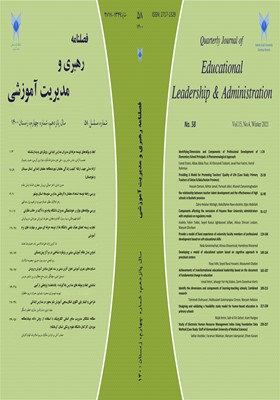Developing a model of educational system based on cognitive approach in preschool centers
Subject Areas :Roya Fathi 1 , Seyed Rasul Hosseini 2 , Masoumeh Oladian 3
1 - PhD Student in Educational Management, Damavand Branch, Islamic Azad University, Damavand, Iran
2 - Assistant Professor of Educational Management, Farhangian University, Tehran, Iran
3 - Assistant Professor of Educational Sciences, Damavand Branch, Islamic Azad University, Damavand, Iran
Keywords: Preschool Children, Cognitive Science, Curriculum, educational system,
Abstract :
The purpose of this study is to develop a model of educational system based on cognitive approach in preschool centers. Since in applied research, the main goal is not only scientific discovery, but also to test and study the application of knowledge, so the method of this research is applied in terms of purpose and has been done by exploratory method. The data collection method is mixed (quantitative and qualitative) and the data collection tool is interviews with experts by conducting semi-structured specialized interviews and questionnaires. Therefore, 292 principals, teachers and staff of preschool centers in the primary education system of Tehran (in the quantitative section) and 15 experts and specialists in this field (in the qualitative section) participated in this study. The collected data were analyzed by descriptive and inferential methods through SPSS 16 and Smart PLS software. After conducting the research, the results showed that the components: cognitive education, psychological characteristics, cognitive academic counseling, leadership and management style, cognitive educational content, educational space and equipment, and finally teaching methods with cognitive approach; Under the heading of components of the educational system based on cognitive approach in preschool centers; Approved. Model fit tests showed the validity of the model.
بازرگان، سیمین. (1386). مقدمه ای بر برنامه ریزی چند بعدی- ماتریس زندگی، تهران، انتشارات مدرسه.
بازرگان، سیمین. فیاض، ایراندخت. حسنوند، باقر. صفری، سجاد. (1394). تاثیر آموزش و پرورش پیش دبستانی بر مبنای برنامهریزی چند بعدی بر رشد مهارت های اجتماعی کودکان پیش دبستانی، روانشناسی تربیتی، 11 (3): 23-41.
پاپینیو، دیوید. (1390). درآمدی بر آگاهی، ترجمه، سید کمال خرازی، تهران: انتشارات سمت.
حسینی، سید عدنان. بدری گرگری، رحیم. سلیمی، حسین و کلیایی، لیلا. (1394). اثربخشی آموزش شناختی ارتقاء امید در کاهش میزان قربانی شدن ناشی از قلدری دانش آموزان، فصلنامه روانشناسی تربیتی، 11 (37): 1-18.
خرازی، کمال. (1374). سیر تحول و تکوین روان شناسی شناختی، مجله روانشناسی و علوم تربیتی، 3(1): 5-3.
خرازی، کمال و تلخابی، محمود. (1390). مبانی آموزش و پرورش شناختی، تهران، نشر سازمان مطالعه و تدوین کتب علوم انسانی دانشگاهها (سمت)، مرکز تحقیق و توسعه علوم انسانی،
سلیمانی، شهناز. احمدی، امینه و احقر، قدسی. (1398). اثربخشی آموزش با رویکرد ساختنگرایی شناختی بر یادگیری، یادداری دانشآموزان پایهی ششم ابتدایی در درس ریاضی، علوم تربیتی و روانشناسی، 7(1): 34-25
عابدی، فاطمه و اخوان، مهناز. (1394). آموزش و پرورش مبتنی بر رویکرد شناختی اجتماعی، اولین کنفرانس بین المللی روانشناسی و علوم تربیتی، شیراز، موسسه عالی علوم و فناوری حکیم عرفی شیراز
عطادخت، اکبر. نریمانی، محمد. حضرتی، شیوا و مجدی، هادی. (1397). مقایسه توانایی برنامه ریزی- سازماندهی و انعطاف پذیری شناختی در دانش آموزان با و بدون اختلال یادگیری خاص، راهبردهای شناختی در یادگیری، 6(10): 15-1
غلامعلی لواسانی، مسعود. راستگو، لیلا. آذرنییاد، آرش و احمدی، طاهر.(1393). اثر آموزش شادکامی به شیوه شناختی رفتاری بر باورهای خودکارآمدی و استرس تحصیلی، راهبردهای شناختی در یادگیری، 2(3): 18-1
گشمردی، محمودرضا. (1396). آموزش زبان با رویکرد شناختی: اهمیت علوم اعصاب شناختی در آموزش زبان خارجی، جستارهای زبانی، 8(4): 28-47
محمدی، نعیما و مستری، مهناز. (1396). بررسی تأثیر رویکردهای آموزشی بر مهارتهای اجتماعی کودکان پیش دبستانی، تعلیم و تربیت، 33(4): 154-135
نسائیان، عباس. اسدی، رقیه و امیری، محسن. (1396). مقایسه تاثیر آموزش مهارت های اجتماعی از طریق رویکرد شناختی و آموزش مستقیم بر مشکلات رفتاری دانش آموزان کم توان ذهنی آموزش پذیر، طب توانبخشی، 6(4): 114-106
یاری مقدم، نفیسه. دلاور، علی. درتاج، فریبرز و حاجی علیزاده، کبری. (1398). تدوین مدل ساختاری درک مطلب خواندن براساس عوامل شناختی فردی دانشآموزان دوره ابتدایی شهر همدان، راهبرد شناختی در یادگیری، 7(13): 20-1
Ashman, A. F., & Conway, R. N. (2017). Cognitive strategies for special education: Process-based instruction, Routledge.
Candra, R., Rahayu, E. S., & Putra, N. M. D. (2020). Development of Science Module SETS Approach to Strengthen Cognitive Learning Outcomes of Elementary School Students, Journal of Primary Education, 9(3): 20-29.
Hraste, M., De Giorgio, A., Jelaska, P. M., Padulo, J., & Granić, I. (2018). When mathematics meets physical activity in the school-aged child: The effect of an integrated motor and cognitive approach to learning geometry, PloS one: 13(8):145-160.
Losey-León, M. A., & Balderas, A. (2019). Cognitive Approach to Adaptive Testing Implementation in Virtual Maritime English Language Learning Environment Based on a Spaced Repetition System, In Teaching Language and Teaching Literature in Virtual Environments (pp. 183-202). Springer, Singapore.
Mainhard, T., Oudman, S., Hornstra, L., Bosker, R. J., & Goetz, T. (2018). Student emotions in class: The relative importance of teachers and their interpersonal relations with students, Learning and Instruction, 53: 109-119.
Mohamed, H., Saidalvi, A., & Tashiron, N. A. (2019). Project Based Learning in Flipped Classroom Based on Student’s Cognitive Style, Recent Technol, 7(63): 696-700.
Obe, W. H. (2018). The teaching of science in primary schools, routledge.
Purwanto, S., & Susanto, E. (2020, February). Development of Physical Education Model Based on Character for Improving Affective, Cognitive, and Psychomotoric Values in Elementary School. In International Conference on Educational Research and Innovation (ICERI 2019) (pp. 319-323). Atlantis Press.
Siburian, J., & Corebima, A. D. (2019). The correlation between critical and creative thinking skills on cognitive learning results, Eurasian Journal of Educational Research, 81: 99-114.
Zumbach, J., Rammerstorfer, L., & Deibl, I. (2020). Cognitive and metacognitive support in learning with a serious game about demographic change, Computers in Human Behavior, 103: 120-129.
_||_

